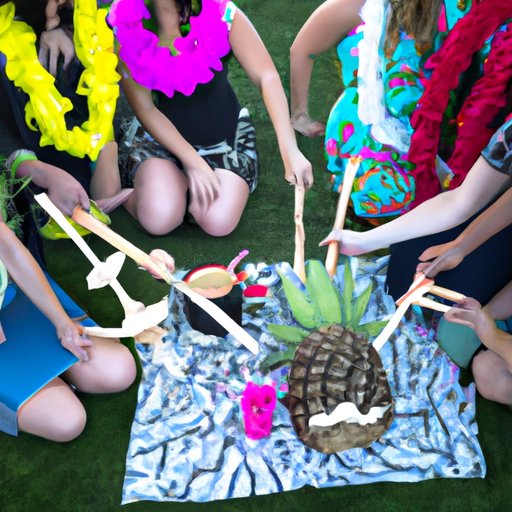Introduction
Cultural appropriation is defined as the adoption or use of elements of one culture by members of another culture. This can take many forms, from wearing traditional clothing to sharing recipes to hosting celebrations. One such celebration that is often discussed in terms of cultural appropriation is the luau. But is a luau actually an example of cultural appropriation? In this article, we will explore the debate surrounding luaus to better understand their implications.
Examining the Debate: Is a Luau Cultural Appropriation?
The first step in understanding the debate around luaus is to look at the history of the traditional luau. The traditional luau was originally a type of feast held in ancient Hawaii. It was typically a communal event, often held to celebrate important events such as births, marriages, and other milestones. The traditional luau included a variety of dishes, music, and hula dancing.
Today, luaus are widely popularized in both Hawaii and mainland United States. They are often hosted in tourist resorts, restaurants, and cruise ships. While some argue that these popularized luaus provide an opportunity to share and experience Hawaiian culture, others contend that they are a form of cultural appropriation. These critics argue that the popularized luaus are a misrepresentation of Hawaiian culture and customs, and that they do not accurately reflect the traditional luau.
It is important to consider the impact of luaus on Indigenous Hawaiian culture. Many argue that the popularization of luaus has led to the commercialization and commodification of Hawaiian culture, which has resulted in the exploitation of Indigenous people. Furthermore, some suggest that the promotion of luaus has led to a “Disneyfication” of Hawaiian culture and values, where Hawaiian traditions are reduced to stereotypes and oversimplified representations.

Exploring the Pros and Cons of a Luau Celebration
When considering the appropriateness of popularizing Hawaiian traditions through luaus, it is important to examine both the benefits and potential risks. On the one hand, there is the potential for luaus to be used as a positive way to celebrate and honor Hawaiian culture. For example, luaus can provide an opportunity for people to learn about Hawaiian traditions and customs, and to experience them firsthand. Furthermore, luaus can also be a way to promote Hawaiian tourism and support local businesses.
On the other hand, there is the potential for misappropriation of culture. When luaus are presented in a way that is inaccurate or disrespectful, they can be seen as a form of cultural appropriation. For example, if the traditional components of the luau are removed or simplified, or if Hawaiian culture is presented in a stereotypical way, then it can be argued that the luau is an example of cultural appropriation.
Understanding the Meaning Behind the Traditional Luau
In order to determine whether or not a luau is an appropriate way to celebrate Hawaiian culture, it is important to understand the meaning behind the traditional luau. The traditional luau was more than just a meal or celebration; it was a way for Hawaiians to connect with each other, share stories, and express their culture and values. As such, it is important to ensure that any modern-day luau honors these traditions and values.
Furthermore, it is important to recognize the implications of popularizing Hawaiian traditions through luaus. While it can be argued that luaus provide an opportunity to share Hawaiian culture and customs, it is also important to consider the risks of such popularization. For example, if Hawaiian culture is presented in a simplified or stereotypical way, or if it is used for commercial purposes, then it could be argued that it is a form of cultural appropriation.

Analyzing the Appropriateness of Popularizing Hawaiian Traditions Through Luaus
Ultimately, the decision of whether or not a luau is an example of cultural appropriation is a complex one. It is important to consider the history and significance of the traditional luau, as well as the potential benefits and risks of popularizing Hawaiian traditions through luaus. It is also essential to recognize the importance of respectful representation of Hawaiian culture when popularizing its traditions.
Those who host luaus should take care to ensure that they are honoring the traditional aspects of the luau, while also avoiding any potential for misappropriation of Hawaiian culture. Furthermore, those who attend luaus should strive to have an open mind and respect for Hawaiian culture, so as to ensure that the event is a positive experience for all involved.
Conclusion
In conclusion, the debate surrounding luaus and whether or not they are an example of cultural appropriation is complex and multifaceted. It is important to understand the history and significance of the traditional luau, as well as the potential benefits and risks of popularizing Hawaiian traditions through luaus. Ultimately, it is essential to recognize the need for respectful representation of Hawaiian culture when popularizing its traditions. By doing so, we can ensure that luaus remain a positive and meaningful celebration of Hawaiian culture.
(Note: Is this article not meeting your expectations? Do you have knowledge or insights to share? Unlock new opportunities and expand your reach by joining our authors team. Click Registration to join us and share your expertise with our readers.)
